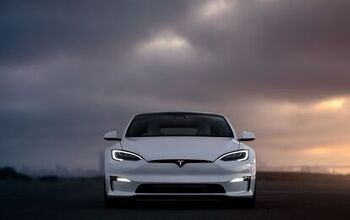General Motors Eyes Carbon Fiber Beds for Future Pickups

General Motors, the company that ran a campaign criticizing Ford for moving away from steel on its F-Series, is expected to implement carbon fiber in the beds of large pickup trucks within two years. Hopefully, the wait gives consumers time to forget some rather negative ads that bemoaned the use of aluminum for its high repair costs and chance of deformation in an impact.
Carbon fiber is ridiculously strong and should hold up in any side-by-side impact test against aluminum. That is, until you start considering price. Carbon fiber costs substantially more to manufacture, form, and fix than either steel or aluminum. That’s probably why GM plans to limit its usage to only highest trim levels, at least until it can figure out a way to keep production costs down.
However, according to the Wall Street Journal, General Motors doesn’t want to keep the exotic weave limited to ultra-expensive models indefinitely. It’s considering the widespread implementation of carbon fiber, as the lightweight material would improve fuel economy by cutting down on weight. But selling it to consumers might be difficult. We know that truck buyers are willing to spend more than ever on a pickup but we don’t know if they’ll option for a bed that isn’t steel without it being roped into an appetizing premium package. They certainly didn’t with GM’s plastic composite beds in the early 2000s.
Carbon fiber isn’t the only lightweight material that appears destined for the GMC Sierra and Chevrolet Silverado, either. The report indicated that we might soon see more aluminum used in both vehicles’ construction — again, to save weight.
It’s hard not to feel bad for the engineers in this case. You can imagine one of them mentioning the need to lighten General Motors’ fleet before someone said, “Well, we can’t use too much aluminum. Those advertising people made that an impossibility for us. What about carbon fiber?”
Selective availability or not, simply using the material will give GM some serious bragging rights. That’s important in the highly competitive truck segment, where every added feature or extra pound of payload capacity can make a difference.
[Image: General Motors]

A staunch consumer advocate tracking industry trends and regulation. Before joining TTAC, Matt spent a decade working for marketing and research firms based in NYC. Clients included several of the world’s largest automakers, global tire brands, and aftermarket part suppliers. Dissatisfied with the corporate world and resentful of having to wear suits everyday, he pivoted to writing about cars. Since then, that man has become an ardent supporter of the right-to-repair movement, been interviewed on the auto industry by national radio broadcasts, driven more rental cars than anyone ever should, participated in amateur rallying events, and received the requisite minimum training as sanctioned by the SCCA. Handy with a wrench, Matt grew up surrounded by Detroit auto workers and managed to get a pizza delivery job before he was legally eligible. He later found himself driving box trucks through Manhattan, guaranteeing future sympathy for actual truckers. He continues to conduct research pertaining to the automotive sector as an independent contractor and has since moved back to his native Michigan, closer to where the cars are born. A contrarian, Matt claims to prefer understeer — stating that front and all-wheel drive vehicles cater best to his driving style.
More by Matt Posky
Latest Car Reviews
Read moreLatest Product Reviews
Read moreRecent Comments
- Lou_BC Let me see. Humans are fallible. They can be very greedy. Politicians sell to the highest bidder. What could go wrong?
- SPPPP Vibrant color 9 times out of 10 for me. There may be a few shapes that look just right in metallic gray, for example. There are a few nices ones out there. And I like VW "White Silver". But I'd usually prefer a deep red or a vibrant metallic green. Or a bright blue.
- 28-Cars-Later Say it ain't so, so reboot #6* isn't going to change anything?[list=1][*]V4-6-8 and High "Tech" 4100.[/*][*]Front wheel drive sooooo modern.[/*][*]NOrthSTARt.[/*][*]Catera wooooo.[/*][*]ATS all the things.[/*][*]We're *are* your daddy's Tesla. [/*][/list=1]
- MaintenanceCosts Can I have the hybrid powertrains and packaging of the RAV4 Hybrid or Prime with the interior materials, design, and build quality of the Mazda?
- ToolGuy I have 2 podcasts to listen to before commenting, stop rushing my homework.


































Comments
Join the conversation
I can't wait until this one-upsmanship finally delivers stealth trucks to the market. What could be better than knowing the truck you'll never fly, has no radar signature on Russian SAM sites?
But, will "CARBON FIBER!!!" be stamped all over the truck? We wouldn't want the owners, who paid big bucks, to have their bed mistaken for a drop in or spray on liner. Alternatively, since GM has spent so much time bashing aluminum beds, they could patent an aluminum alloy. Then rebadge it as Duratanium®.